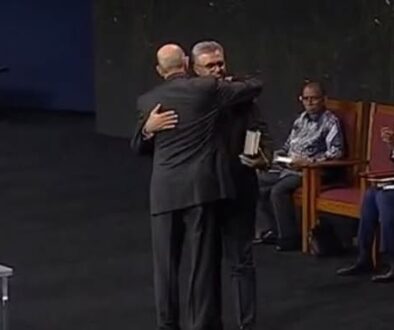Denominational Leaders in Europe say “Business as Usual is Not an Option”
by AT News Team
With the goal of developing models appropriate to contemporary socio-cultural trends in Europe, 43 denominational administrators, pastors and lay representatives from the 14 union conferences and related units in the Trans-European Division (TED) of the Seventh-day Adventist Church met at Newbold College near London May 10-12 (2012) for a consultation on strategic, missional issues. “One of the main reasons for calling this meeting was to create an ‘incubator’ for new approaches … especially in church planting,” said Pastor Janos Kovacs-Biro, the TED staff member who facilitated the gathering.
Dr. Bertil Wiklander, president of the Adventist denomination in the TED region, said in a keynote address that “being an Adventist is fundamentally a matter of longing for God, and this longing finds its fulfillment in the vision of Revelation 21:1-5.” He pointed out that “the little church family established in May 1863 was able to grow and spread itself to all countries in the world because they began to think differently and discover new possibilities.”
Dr. Wiklander listed eight major challenges that face the Church today in Europe: (1) “The Church misunderstands different cultures; those who don’t look like us and don’t talk and 'smell' like us … are seen as an enemy of the church. (2) The Church is apathetic; [there is] skepticism and no successful [models] in the past. (3) Attrition; are people not interested in faith anymore? (4) Frustration; why do members keep leaving? (5) The Church is concerned about the 'front door,' but leaves the 'back door' open wide. (6) The Church is boring [to young adults]. (7) Churchless spirituality; ‘we do not need to go to church but can stay at home or go out in nature to pray.’ (8) The Church likes to keep one form forever, [ignoring the fact that] people are adventurous and like to move in the way the spirit leads.”
Dr. Wiklander pointed to neglected truths in Scripture that might empower the church for new expressions of Christ’s mission. “Be renewed by His Word! Think differently and think possibilities! … Then our eyes will be opened and we will see the opportunities for God’s mission in Europe today!”
Dr. Daniel Duda, education director for the TED, presented a study on the ecclesiastical role of the church, showing how Jesus’ cultural sensitivity was successful in bringing people to an understanding of the Kingdom. Dr. Miroslav Pujic, director of ministry to post moderns in the TED, gave a presentation on the cultural paradigm shift that began in Europe 30 years ago. “The Adventist Church [has] failed to grasp that living in a new culture really makes a difference in the way people think and approach life,” he stated. “Church membership and attendance is shrinking and newcomers are fewer. Business as usual is not going to help us.”
A number of case studies were shared about innovative ministries that are working well in the post modern context. Honest analysis and “thinking out of the box” were encouraged. The whole consultation was embedded in prayer. “It is time to change from a talking church into a [church] representing God where meeting people's needs and making God's message relevant are the key activities of the Church,” commented Kovacs-Biro.
“I am excited by how seriously the leadership of our church are taking the challenge of the indigenous majority population.” Said Rosemary Lethbridge, a church planter in the U.K. “Success will not be achieved overnight. We need much prayer, patience and support from our leaders.”
“How should we react to the challenge of secularism and post modernism?” asked Pastor Arne-Kristian Andersen from Norway. “How should we respond to the great gulf between God's ideal and the messy reality of this age? Sometimes it seems that our response has been to isolate ourselves in order to preserve our own holiness. … Circumstances force us to go back to basics: a loving, Spirit-filled Church meeting the needs of the community and calling them to follow Christ. It's time to follow our Rabbi out of isolation and into the great adventure that awaits.”
“We are a church in the business of change,” Dr. Wiklander said in his concluding remarks. “If everything could remain the same, there would be no need for mission! But our mission is change, therefore we as a church must change.”
The consultation adopted several basic commitments: “To being biblically grounded and intentionally prayerful in making God known, felt and heard among competing voices in Europe. … To living an authentic Christian life … to intentionally re-thinking and changing our approach … to become more relationally orientated through consciously participating in all dimensions of life … to serve the real and felt needs of the whole community, not just of the local churches … to creating alternative worship spaces where everyone is fully respected … intentionally building inclusive, just and merciful communities that foster reconciliation, healing and the fullness of life in Christ … to learning and developing fresh ways to communicate the biblical message through experiential means such as stories, metaphors, drama, art, music and life experiences that present the Gospel in a simple, understandable and relevant way … to training our children and young people in discipleship and community engagement, so that they may reach their generation for Christ … to modeling and engaging in the arenas of public life, civic authorities, business and academia as they shape societal values and have a strong influence on public debate … to engaging and supporting immigrant Adventist groups in their ministries to reach their ethnic groups [and] international students as well as the majority ethnic populations … to defining, modeling and creating a positive perception of what it means to be an engaged community of believers with a clear and strong Seventh-day Adventist identity.”
This story is based on a report in the May 28, 2012, issue of TED News.



